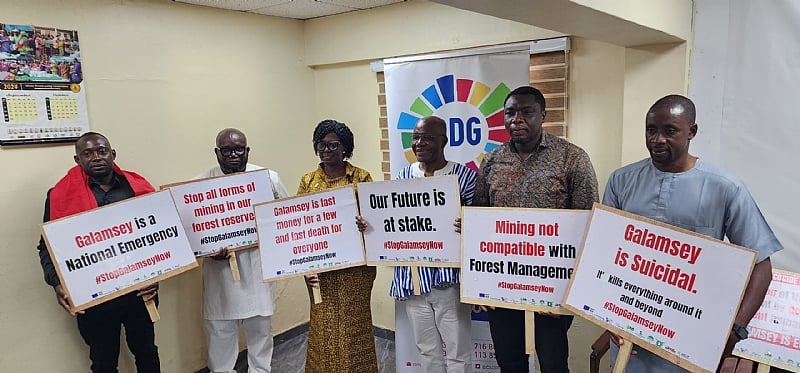The Ghana Civil Society Organizations (CSOs) Platform on Sustainable Development Goals (SDGs) has voiced deep concerns regarding the escalating crisis of illegal mining, known locally as galamsey, and its detrimental effects on Ghana’s achievements toward the SDGs. During a press conference held in Accra, Mrs. Beauty Emefa Narteh, the Executive Secretary of the Ghana Anti-Corruption Coalition and Co-Chair of the CSOs SDGs Platform, highlighted the urgent need for government intervention amidst this crisis. She underscored that galamsey threatens the foundations of sustainable development by undermining rural livelihoods, public health, food security, and the sustainable management of natural resources essential for future generations.
Mrs. Narteh called on President Nana Addo Dankwa Akufo-Addo to take immediate and decisive measures to combat this growing threat by revoking Legislative Instrument (LI) 2426, which permits mining activities in certain areas, and withdrawing licenses for reconnaissance, prospecting, exploration, and mining within forests and protected reserves. She urged the government to rigorously enforce existing laws against illegal mining activities, emphasizing the need to halt operations in critical areas, particularly water bodies and forest reserves. Additionally, she highlighted the necessity for the full implementation of buffer zone policies that would provide essential protection for Ghana’s natural resources.
In a show of solidarity with the imminent organized labor strike scheduled for October 10, the platform emphasized the collective effort required to pressure the government to take a firm stance against illegal mining operations. Mrs. Narteh appealed to all members and affiliates of civil society organizations to participate in the strike, emphasizing that united action is imperative for compelling the government to prioritize environmental protection, uphold community rights, and advance sustainable development goals. The mobilization reflects a growing frustration within society regarding the government’s limited actions against galamsey, suggesting a need for broader societal engagement in the environmental movement.
Ing. Kenneth Ashigbey, the convenor of the Media Coalition Against Galamsey, expanded on the critical ramifications of illegal mining for both human health and the environment. He reported alarming statistics indicating a disproportionate rise in renal diseases, spontaneous abortions, and birth defects directly linked to the hazardous practices associated with galamsey. The damage to Ghana’s water bodies is particularly troubling, leading to a significant decline in fishery jobs, which threatens the livelihoods of many families in the fishing industry.
Furthermore, Ing. Ashigbey emphasized that the crisis caused by illegal mining is graver than the previous COVID-19 pandemic, illustrating the urgent need for the government to act responsibly and without delay. He criticized the measures put forth by the government as inadequate and called for President Akufo-Addo to invoke Article 31, thereby declaring a state of emergency to effectively confront the illegal mining crisis. His urgent message stressed the severity of the issues faced, reiterating that mere dialogue is insufficient, and that immediate, decisive actions are needed to prevent further environmental degradation.
In conclusion, both the CSOs Platform and the Media Coalition Against Galamsey are united in their demand for a comprehensive response to the galamsey crisis, advocating for protective measures to salvage the country’s natural resources and safeguard public health. While the call for governmental intervention is clear, the collective action demonstrated by civil society organizations signals a growing momentum for accountability and effective governance in addressing the challenges posed by illegal mining. As Ghana grapples with these pressing issues, the commitment of both civil society and organized labor to combat environmental degradation reflects a significant turning point in the quest for sustainable development.














